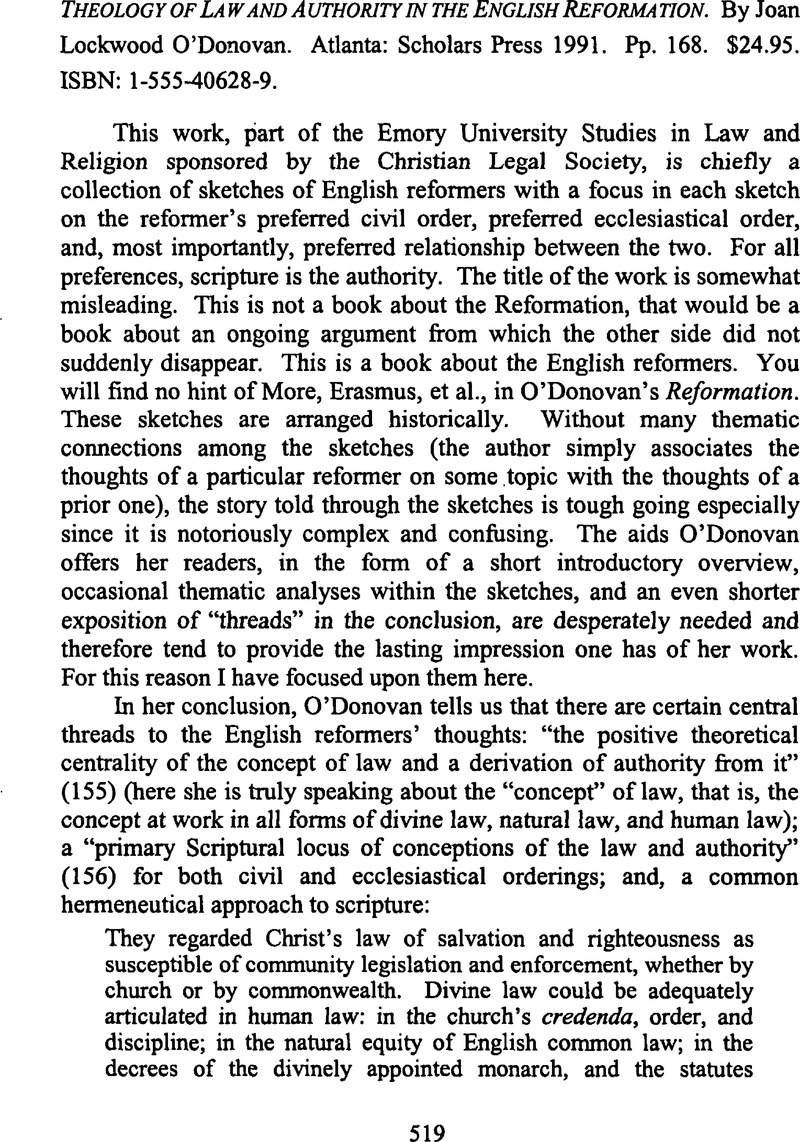No CrossRef data available.
Published online by Cambridge University Press: 24 April 2015

1. Marsilius here stands for the argument that the ruler, as representative of the body politic, has the authority to decide and impose all the external institutional features of Christian belief and practice. See O'Donovan, O. & O'Donovan, J.L., eds., From Irenaeus to Grotius: A Sourcebook in Christian Political Thought 423–427 (Eerdman Publg. 1999)Google Scholar. This is a later anthology by Joan Lockwood O'Donovan and fellow theologian and husband, Oliver O'Donovan which, in its introduction to several authors, covers some of the same ground as Theology of Law and Authority in the English Reformation. I highly recommend it to you.
2. Of course, Tyndale, and, in fact, most of the early reformers were also involved in the task of making the scriptures available to the English people. In many ways, I think, this is, for better or worse, see, e.g. Hauerwas, Stanley, Unleashing the Scripture: Freeing the Bible from Captivity to America (Abingdon Press 1991)Google Scholar, the primary accomplishment of the English Reformation. It is hard to overestimate its effect on the sixteenth, seventeenth, and even eighteenth centuries. To put the radical nature of these acts in perspective, in the fifteenth century, the mere fact of owning the Bible in English was presumptive evidence of heresy. See, Hill, Christopher. The English Bible and the Seventeenth Century Revolution 10 (Penguin Press 1994)Google Scholar [hereinafter Hill]. Despite that, however, more than a century before Henry Vm, the Lollards were circulating English manuscript versions of the scripture. Hill, supra at 10. After the Marian Exiles, discussed briefly below, the marginal notes of the radical reformers Genevian Bible become extremely important to the Radical Reform, but this goes beyond Professor O'Donovan's study.
3. Yoder, J.H., The Priestly Kingdom: Social Ethics as Gospel 107 (Notre Dame Press 1984)Google Scholar.
4. Id.
5. See Brueggemann, Walter, Theology of the Old Testament: Testimony, Dispute, Advocacy (Augsburg Fortress 1997)Google Scholar. Brueggemann notes the anti-Semitic nature of the reformers' readings. (112) He attributes this, at least in part, to the fact that reformers, unlike some of their predecessors were without Jewish conversational partners (108) and describes the resources to which I refer in the text. (600-649) On the subject of reformers' exegesis, Oliver O'Donovan describes Cranmer's method as “tak[ing] out a single disconnected image or theme from it” and, thus, “to treat the history of God's reign like a commonplace book or a dictionary of quotations.” O'Donovan, Oliver, Desire of Nations: Rediscovering the Roots of Political Theory 27 (Cambridge U. Press 1996)Google Scholar.
6. Hill captures this very nicely when he says that from our perspective, the sixteenth and seventeenth centuries were not a more religious time, but, in many senses, a less religious one, meaning, I believe, that a “religious” time that is defined in part in response to a “secular” one is not going to be easily found in the sixteenth or seventeenth centuries. See Hill, supra n. 2, at 7.
7. Id.
8. The German name of Erastus is Thomas Lueber. He would not recognize his name or himself in much of what has come to be called Erastianism. Lueber's main complaint was that the Christian church should not set itself up as another coercive power alongside the state, but his state was itself Christian. See Hastings, Adrian, Mason, Alistar, & Pyper, Hugh, eds., The Oxford Companion to Christian Thought 205–206 (Oxford U. Press 2000) (entry by Mason, A.)Google Scholar.
9. I think, for example, that much of the jurisprudence of the First Amendment appears far more consistent than it does to most when it is seen within the history of a diminishing effort to maintain the particular, and quite unique, political theology of the Revolution.
10. I hope that it is sufficiently clear in the text that I am not taking a position here but just pointing out a theological argument that I think is missing from an important conversation. This is something lawyers do. If I were to take a position, it would be to suggest that More and Erasmus offered good “solutions” to all of this, some of which were reflected in Hooker.